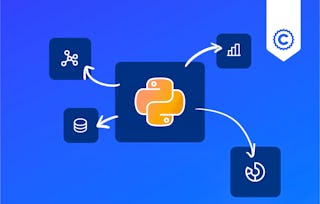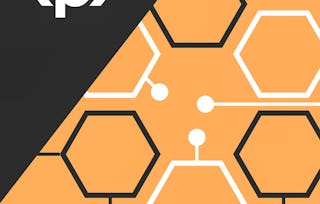This Python for Data Visualization Analysis course provides a practical introduction to data visualization and exploratory data analysis (EDA) using Python. You will work with Matplotlib and Seaborn to create clear and effective visualizations, use Plotly to build interactive charts and dashboards, and apply advanced graphical techniques for EDA on complex datasets. Learn to present data clearly and extract meaningful insights through visual analysis.

Python for Data Visualization and Analysis

Python for Data Visualization and Analysis
This course is part of Applied Data Analytics Specialization

Instructor: Edureka
Included with
Recommended experience
What you'll learn
Create impactful visualizations using Matplotlib and Seaborn to represent complex datasets effectively.
Build dynamic, interactive charts and dashboards with Plotly and IPyWidgets for enhanced data exploration.
Build dynamic, interactive charts and dashboards with Plotly and IPyWidgets for enhanced data exploration.
Deploy interactive data visualization applications seamlessly with Streamlit to share analysis results.
Skills you'll gain
Details to know

Add to your LinkedIn profile
13 assignments
See how employees at top companies are mastering in-demand skills

Build your subject-matter expertise
- Learn new concepts from industry experts
- Gain a foundational understanding of a subject or tool
- Develop job-relevant skills with hands-on projects
- Earn a shareable career certificate

There are 4 modules in this course
In this module, learners will explore how to create various types of visualizations using Matplotlib. They will learn to apply these visuals to complex datasets, uncovering hidden insights that facilitate informed decision-making.
What's included
17 videos5 readings4 assignments1 discussion prompt
In this module, learners will delve into data visualization with Seaborn, mastering the creation of diverse plots while developing skills to customize and refine visuals for improved presentation and interactivity.
What's included
12 videos2 readings3 assignments1 discussion prompt
In this module, learners will explore how to create interactive plots using Plotly, enhance exploratory data analysis (EDA) with IPyWidgets, and build shareable web applications with Streamlit. They will also gain the skills to develop dynamic dashboards and interactive reports for effective data presentation.
What's included
24 videos3 readings5 assignments1 discussion prompt
This module is designed to assess an individual on the various concepts and teachings covered in this course. Evaluate your knowledge with a comprehensive graded quiz on data visualization concepts, Matploltlib, Seaborn, Plotly and Association rule mining.
What's included
1 video1 reading1 assignment1 discussion prompt
Earn a career certificate
Add this credential to your LinkedIn profile, resume, or CV. Share it on social media and in your performance review.
Explore more from Data Analysis
 Status: Free Trial
Status: Free Trial Status: Preview
Status: Preview
Why people choose Coursera for their career

Felipe M.

Jennifer J.

Larry W.

Chaitanya A.

Open new doors with Coursera Plus
Unlimited access to 10,000+ world-class courses, hands-on projects, and job-ready certificate programs - all included in your subscription
Advance your career with an online degree
Earn a degree from world-class universities - 100% online
Join over 3,400 global companies that choose Coursera for Business
Upskill your employees to excel in the digital economy
Frequently asked questions
This course is ideal for data analysts, aspiring data scientists, and Python programmers who want to develop skills in data visualization and exploratory data analysis using Python. A basic understanding of Python programming and familiarity with libraries like Pandas or NumPy is recommended.
No prior experience in data visualization is required. This course provides a step-by-step approach, starting with foundational concepts and progressing to advanced techniques using tools like Matplotlib, Seaborn, and Plotly.
By the end of the course, you’ll be able to:
- Design professional and interactive data visualizations.
- Perform EDA to uncover patterns and trends in data.
- Deploy data visualization applications using Streamlit.
More questions
Financial aid available,



